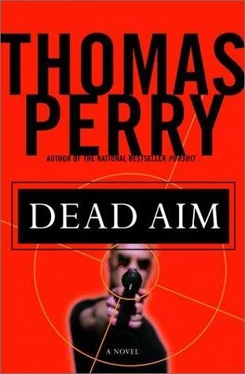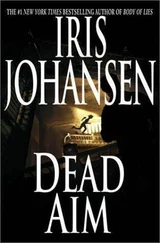Thomas Perry - Dead Aim
Здесь есть возможность читать онлайн «Thomas Perry - Dead Aim» весь текст электронной книги совершенно бесплатно (целиком полную версию без сокращений). В некоторых случаях можно слушать аудио, скачать через торрент в формате fb2 и присутствует краткое содержание. Жанр: Триллер, на английском языке. Описание произведения, (предисловие) а так же отзывы посетителей доступны на портале библиотеки ЛибКат.
- Название:Dead Aim
- Автор:
- Жанр:
- Год:неизвестен
- ISBN:нет данных
- Рейтинг книги:4 / 5. Голосов: 1
-
Избранное:Добавить в избранное
- Отзывы:
-
Ваша оценка:
- 80
- 1
- 2
- 3
- 4
- 5
Dead Aim: краткое содержание, описание и аннотация
Предлагаем к чтению аннотацию, описание, краткое содержание или предисловие (зависит от того, что написал сам автор книги «Dead Aim»). Если вы не нашли необходимую информацию о книге — напишите в комментариях, мы постараемся отыскать её.
Dead Aim — читать онлайн бесплатно полную книгу (весь текст) целиком
Ниже представлен текст книги, разбитый по страницам. Система сохранения места последней прочитанной страницы, позволяет с удобством читать онлайн бесплатно книгу «Dead Aim», без необходимости каждый раз заново искать на чём Вы остановились. Поставьте закладку, и сможете в любой момент перейти на страницу, на которой закончили чтение.
Интервал:
Закладка:
When she stopped talking, Parish looked at her sharply. She began again. “I wasn’t prepared. On an impulse, I had an affair with a partner. David. He was cruel to me. I broke it off. He made it clear that I didn’t have that option. I was afraid, but more afraid of giving in to him than of being fired. So he had me fired. When I told them I’d fight, they produced a file full of fake negative performance evaluations. In the meeting, in front of all the senior partners, one of them said, ‘You’re a disruptive influence. Who you fuck or won’t fuck is taking up billable hours. You’re not good enough as a litigator to make up the lost money. Nobody is.’ ”
Parish was looking past her again. “It’s time.” He stood up and she glanced over her shoulder to see Mary O’Connor put a cell phone into her purse and walk out of the restaurant into the hotel lobby. Marcia turned toward Parish, but he was heading for the door that led through the garden to the street.
She followed. He had done it. He had gotten her to talk through all of the waiting, and had gotten her to talk about her injustice, to make her pick at the sore until she felt the hatred like a stab. She saw Parish come close to Mary on the street, and saw her tell him something. He waved his hand at a cab, and when it stopped, Mary got into it. Parish walked back to join Marcia. “The place is a bar in Georgetown. It’s called Handel’s. Have you been there?”
She shook her head. “Uh-uh. Never heard of it.”
“Good.” He took her arm and looked at his watch, then conducted her toward the Metro stop. “We’ll take the subway.”
In the Bethesda station, Marcia watched Parish step up to one of the big automatic ticket machines along the wall at the bottom of the long escalator, push the plus and minus buttons until he got the right fare, then slip a bill into the machine, take the tickets, and scoop up his change. She had thought she would be the one to do that, because she was the one who had lived in Washington. But Parish seemed to have been everywhere and to know how all systems worked. He repeated the process. Four tickets? Return, of course. She would not have bothered.
They took up places near the tracks and watched the lights that were set into the pavement blink on and off to signal that a train was coming. The train slid into place at their feet and they stepped through the doorway and sat together in one of the orange plastic benches near the front of the car, but they did not speak. She realized that she missed being one of the people who came down into a station and stepped onto one of these trains that used to take her to work.
Everybody in the Washington subway seemed to wear a plastic pass on a long lanyard around his neck. It was a status symbol that had started with government workers and spread. Like all status symbols, it had a reverse effect. Marcia had always worn a smooth, tailored suit and kept it fresh by never sitting down on the train. An attorney for Spailer, Creeden and West didn’t have anything as common as a security pass around her neck, any more than a cabinet officer did. She could feel a tight, angry knot in her stomach.
She looked at Parish, who was staring straight ahead, his expression vacant and his body at perfect rest. It was his fault that she felt the bitterness so strongly tonight. He had reminded her, and now each step was one more familiar sensation that she had not felt in over a year, and had missed.
The vibration of the Metro train that she felt under her feet reminded her that she would never ride it again, not all dressed up on her way to that beautiful office in Georgetown. Even the hotel restaurant near the Bethesda station had set off feelings of loss. She wondered if Parish had known before he had asked.
The ride took only twenty minutes, and as the train pulled in briefly at each of the familiar stops, she felt the intensity of her anger growing. Her life had been destroyed. She was willing to concede that what she was most angry about was that a whole system of false beliefs had been wrecked, shown to be untenable. But anyone could have seen that she had needed those illusions. She was also aware that billions of people in the past had lived and died without ever being disabused of similar beliefs. Why could hers not have been preserved?
When she had been at school, she and some friends had spent hours discussing what the unforgivable sin was, the one that could never be erased by absolution. The majority had said it was witchcraft. Marcia had thought it was destroying another person’s faith. What had set that off? Oh, yes. A Hawthorne story they had read in class. Things were so much more complicated in girls’ schools than mere philosophical inquiry. The witchcraft answer had gained adherents because one girl had been having a feud with two others, and burning candles in her room with ominous incantations. The faith answer was not free from outside influences either. Tanya Holbrooke had recently scandalized a few classmates by referring to born-again Christians as “fooled again,” and they spent most of the time during the discussion giving her sidelong glances.
That had not been what Marcia had meant when she had chosen that position. She had meant someone like Hitler, who had done something so evil that a person who had seen it happen would find the world intolerable and the idea of a loving God laughable.
The train began to slow as it approached Farragut North, and she stood up. Parish remained seated until it stopped, then joined her. The door slid open and they walked to the escalator and came up on I Street.
The night was warm, but it was beginning to rain now, a soft, persistent rain that had already made the streets shine with reflected headlights and taillights, and made Marcia stay close to buildings to take advantage of awnings and overhangs.
This part of I Street had a few old, quiet, pretty hotels and restaurants, a lot of businesses that sold clean, small things like watches and invisible things like travel and investments. A couple of blocks south, the diagonal of Pennsylvania Avenue marked the busy, faster-paced zone where a small, quiet bar was an impossibility. She had never been to the bar that Emily Lyons had tracked him to, although she had walked that part of Washington completely a number of times when she had lived here. A person didn’t have to be away for long before things began to change, and there were few places left for memory to hang on to.
She saw the corner coming up, and confirmed her impression. This was a bar that had not existed when she had worked for the firm. But there was a new, nagging sadness. She could not remember what had been on this spot before. She could not bring back any image of what had been, only look at the windows and the doorway of the place, and see a business that could as easily have been on an intersection in Cincinnati or Philadelphia.
She slowed and began to watch Parish. He had put an earpiece into his right ear, and he was listening as he walked. It occurred to her that he looked like a Secret Service agent, with the thin wire the color of a doll’s skin leading to the single earphone, and the raincoat that might cover a gun. Tonight it covered two of them: his, and hers.
He said, “Emily says that he’s in a booth with a young woman. We’ll have to wait.”
She let a frown show, then worried that he might have seen it.
“Does that bother you?” he asked. His curiosity seemed intrusive, voyeuristic.
“The woman?” she asked. “Believe me, it’s not jealousy. I’m just frustrated that I can’t get it over with. She’s an inconvenience.”
“Emily says it won’t be long.”
“What won’t?”
“They finished dinner a while ago, and they’re drinking. She’ll go to the ladies’ room, or he’ll go to the men’s.”
Читать дальшеИнтервал:
Закладка:
Похожие книги на «Dead Aim»
Представляем Вашему вниманию похожие книги на «Dead Aim» списком для выбора. Мы отобрали схожую по названию и смыслу литературу в надежде предоставить читателям больше вариантов отыскать новые, интересные, ещё непрочитанные произведения.
Обсуждение, отзывы о книге «Dead Aim» и просто собственные мнения читателей. Оставьте ваши комментарии, напишите, что Вы думаете о произведении, его смысле или главных героях. Укажите что конкретно понравилось, а что нет, и почему Вы так считаете.












